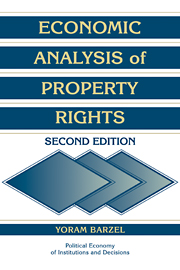Book contents
- Frontmatter
- Contents
- Series editors' preface
- Preface to the second edition
- Preface to the first edition
- Introduction
- 1 The property rights model
- 2 The public domain: Rationing by waiting and price controls
- 3 Contract choice: The tenancy contract
- 4 Divided ownership
- 5 The old firm and the new organization
- 6 The formation of rights
- 7 Slavery
- 8 Wealth-maximizing constraints on property rights
- 9 Property rights and non-market allocation
- 10 Additional property rights applications
- 11 The property rights model: Recapitulation
- References
- Index
3 - Contract choice: The tenancy contract
Published online by Cambridge University Press: 05 June 2012
- Frontmatter
- Contents
- Series editors' preface
- Preface to the second edition
- Preface to the first edition
- Introduction
- 1 The property rights model
- 2 The public domain: Rationing by waiting and price controls
- 3 Contract choice: The tenancy contract
- 4 Divided ownership
- 5 The old firm and the new organization
- 6 The formation of rights
- 7 Slavery
- 8 Wealth-maximizing constraints on property rights
- 9 Property rights and non-market allocation
- 10 Additional property rights applications
- 11 The property rights model: Recapitulation
- References
- Index
Summary
At the heart of the study of property rights lies the study of contracts. Contracts, whether formal or informal, reallocate rights among contracting parties. I will focus here on private contracts that are enforceable by the courts and the police. The tenancy contract between tenant and landlord – between the owner of labor and the owner of land – is relatively simple and is thus a suitable point from which to begin the study of contracts.
On a family farm, a single operator or a single family – the owner of labor – undertakes the bulk of farm activities. Family farming is common and relatively simply organized. By studying tenancy contracts in the context of family farming, it is possible to isolate some basic contracting problems that may be obscured in more complex organizations. As a background to the analysis of the tenancy contract I offer a critical review of the traditional approach to the relationship between tenant and landlord.
THE SHARE CONTRACT AND CHEUNG'S CONTRIBUTION
Price theory textbooks routinely introduce the notion of a production function and discuss the marginal product of a factor such as labor for given levels of such other factors as capital and land. Given the productivity of the factors and the market prices of factors and products, it is easy to determine both the optimum amounts and the values of the contributions of each factor.
- Type
- Chapter
- Information
- Economic Analysis of Property Rights , pp. 33 - 54Publisher: Cambridge University PressPrint publication year: 1997



